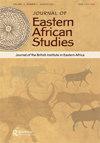南苏丹穆尔勒人的政治:国家暴力、流离失所和身份叙事化
IF 0.6
3区 社会学
Q2 AREA STUDIES
引用次数: 0
摘要
ABSTRACT 这篇文章通过关注在武装冲突期间,穆尔勒人和ŋalam 人的身份是如何在不同地方以不同方式重叠使用的,对南苏丹的身份是如何被协商和争夺的进行了细致入微的阐述。因此,本报告探讨了政治暴力与种族的工具性部署之间的相互作用。文章以 2012-2014 年南苏丹政府与穆尔勒族叛军之间的战争为重点,揭示了穆尔勒族长期以来 "凶猛、充满敌意 "的刻板形象--这一形象是在殖民地时期与更强大的邻国交涉时形成的,并因其在随后的治理结构中占据主导地位而得以延续。文章特别讨论了来自博马的穆尔勒族农业社区如何通过激活临时的次族裔身份和驾驭穆尔勒族的暴力来找到保护策略。这挑战了生计或生态模式与身份之间 "自然化 "的联系,并展示了空间移动如何影响种族身份的工具性叙事。文章认为,民族性与国家及其战略和机遇之间存在持续的相互作用。身份认同的形成和身份认同政治是一个相互联系的过程--国家和接受者都将其作为保护自己免受暴力侵害的手段。本文章由计算机程序翻译,如有差异,请以英文原文为准。
The politics of being Murle in South Sudan: state violence, displacement and the narrativisation of identity
ABSTRACT The article offers a nuanced account of how identities are negotiated and contested in South Sudan, by focusing on how Murle and ŋalam identities were deployed in different ways in different places in overlapping periods during a time of armed conflict. As such, it explores the interplay between political violence and the instrumental deployment of ethnicity. Focusing on the 2012–2014 period of war between South Sudan's government and a largely Murle rebellion, it unpacks the longstanding Murle stereotyping as ‘fierce and hostile’ – an image fostered by the interlocution of more powerful neighbours in the colonial encounters and sustained by their dominance in subsequent governance structures. The article specifically discusses how Murle agricultural communities from Boma found protection strategies by activating temporary sub-ethnic identities and navigating the violence of being Murle. This challenges the “naturalised” linkages between modes of subsistence or ecology, and identity, and demonstrates how spatial movements affect the instrumental narrativisation of ethnic identities. The article argues for the continual interplay of ethnicity in relation to the state and its strategies and opportunities. Identity-making and identity-politics are dialctical processes – deployed by the state as much as by those on the receiving end as a source of protection from violence.
求助全文
通过发布文献求助,成功后即可免费获取论文全文。
去求助
来源期刊

Journal of Eastern African Studies
AREA STUDIES-
CiteScore
3.30
自引率
7.10%
发文量
12
期刊介绍:
Journal of Eastern African Studies is an international publication of the British Institute in Eastern Africa, published four times each year. It aims to promote fresh scholarly enquiry on the region from within the humanities and the social sciences, and to encourage work that communicates across disciplinary boundaries. It seeks to foster inter-disciplinary analysis, strong comparative perspectives, and research employing the most significant theoretical or methodological approaches for the region.
 求助内容:
求助内容: 应助结果提醒方式:
应助结果提醒方式:


